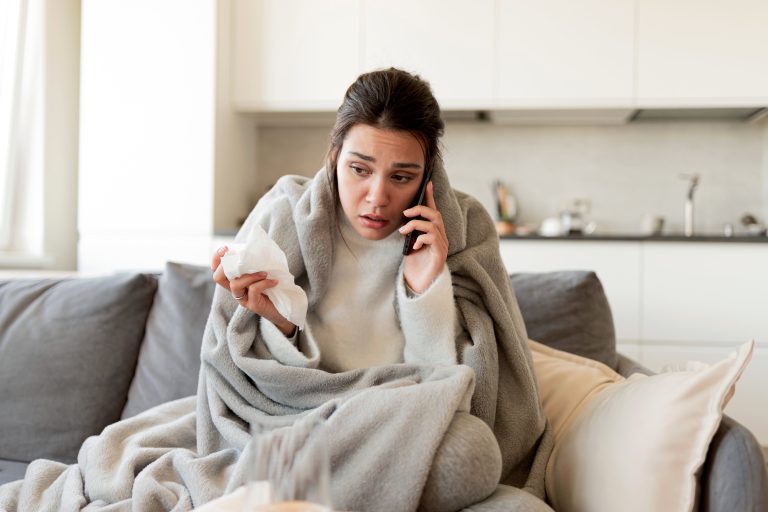BLOG
Help, an employee has COVID-19 | How to handle suspected and confirmed cases
With daily case numbers now significantly higher than they were throughout most of 2020, COVID-19 may feel a lot closer to home than it did six months ago. Indeed, with a new, more infectious variant in circulation, you may have experienced a recent spate of staff absences, or even a confirmed case on your premises.
So, what do you need to do as an employer? Well, that depends.
Blog

If they have symptoms but haven't had a test yet...
If a person becomes symptomatic while at work, you should send them home immediately and clean any surfaces that they have come into contact with – your usual cleaning products will suffice. If they are at home when symptoms appear, they should be advised to stay there; under no circumstances should they attend the workplace. In both cases, the worker should get a test and self-isolate while they await the result.
In the meantime, obtain a list of any colleagues the potentially infectious person has been in close contact with at work in the last 48 hours and inform them of the situation, without naming names. These individuals should be advised to avoid contact with high-risk people and be extra stringent with social distancing and hygiene measures; however, unless they are contacted by NHS Test and Trace or start to display symptoms themselves, they can still attend work.
If the symptomatic worker tests negative, they can return to work as soon as they feel better.
Free Download: Staff Self-Isolation Memo
This memo can be sent to staff to explain what will happen if they test positive for COVID-19 and set out employers and employees’ obligations regarding self-isolation.

If an employee has positive for COVID-19...
If you have an employee who has tested positive for COVID-19, they must isolate for 10 days from the date on which their symptoms began.
It’s important that you don’t put pressure on COVID-positive workers to return to work sooner as they may still be infectious, putting you at risk of a potential outbreak in the workplace. What’s more, under new regulations, it is an offence for an employer to knowingly permit a worker (including an agency worker) to attend any place other than where the individual is self-isolating, with fines starting at £1,000.
Once they have completed their self-isolation period and feel well enough, they can return to work.
If you have had multiple confirmed cases...
If you experience multiple COVID cases in your workplace (currently defined as five cases within 14 days), you will need to contact your local Public Health England protection team, who help you to manage the outbreak.
If you suspect that an employee caught COVID through work…
In addition to the above measures, if a worker is diagnosed as having COVID-19 and there is “reasonable evidence” to suggest that they contracted the virus as a direct result of their work, you must make a report to the relevant enforcing authority under the Reporting of Injuries, Diseases and Dangerous Occurrences Regulations 2013 (RIDDOR).
- If something happens at work which results in (or could have resulted in) the release or escape of coronavirus, this should be reported as a dangerous occurrence.
- If a member of staff tests positive for COVID-19 and there is reasonable evidence suggesting that work-related exposure was the likely cause of them contracting the virus, this should be reported as a case of the disease.
- If a member of staff dies as a result of COVID-19, a registered medical practitioner has confirmed this as the likely cause of death, and there is reasonable evidence of occupational exposure, this should be reported as a work-related death due to exposure to a biological agent.
All employers must comply with these reporting requirements; failure to make a RIDDOR report in certain situations is a criminal offence and individuals and/or companies can be prosecuted.
If you are uncertain, the Health and safety Executive (HSE) has published guidance for employers on what constitutes a diagnosis and making a judgement and reasonable evidence.
The HSE gives the following as an example of a reportable dangerous occurrence:
“A laboratory worker accidentally smashes a vial containing coronavirus on the floor (i.e. outside of a microbiological safety cabinet), leading to people being exposed.”
With this example in mind, many cases are unlikely to be RIDDOR reportable.
If an employee isn't ill but needs to self-isolate
You may have a worker who isn’t unwell themselves but lives with someone (or is in a support bubble with someone) who has either tested positive or has symptoms. They may also have received a notification from NHS Test and Trace instructing them to self-isolate.
In this situation, the worker should self-isolate for 10 days from their last contact with the person in question, even if the worker themselves tests negative. If the person in their household or support bubble tests negative, the worker can then stop self-isolating.

More helpful resources
Confused about sickness absence and self-isolation? For further guidance and templates, why not register for our Coronavirus Advice Hub. Hundreds of helpful resources on all your employee and safety-related challenges, available completely free of charge.
Alternatively, if you would like to talk through your situation with an Employment Law or Health & Safety specialist for expert advice, we’re available now. Call 0345 226 8393 or request your free consultation using the button below.
Sign up for the latest news & insights
Resources
Latest News & Insights

Do ADHD and autism qualify as a disability? | Understanding the Equality Act 2010 and new case law
BLOG Written on 14 July 2025 When an employee discloses that they have ADHD or autism, many employers find themselves asking: Is this classed as

Privacy vs practicality | Are you entitled to know the reason for an employee’s sickness absence?
BLOG Written on 14 July 2025 When an employee calls in sick, it’s natural for employers to want to understand the situation. However, questions around

Education | What school leaders need to know about September 2025 pay changes
BLOG Written on 9 July 2025 As we near the end of the summer term, headteachers, school business managers and senior Trust staff, along with

Employment Rights Bill Implementation Roadmap | Your quick guide to what’s coming when
BLOG Written on 4 July 2025 The Employment Law Bill promises the biggest shake-up of UK employment law in decades. Having recently cleared the Committee

Fewer lives lost | Key takeaways from the HSE’s 2024/25 fatal injury statistics
Blog Written on 3 July 2025 The Health and Safety Executive (HSE) has published its provisional fatal injury statistics for 2024/25, revealing a welcome decline

Candidate feedback | The secret superpower that can strengthen your recruitment process
BLOG Written by Danielle Fargnoli-Read on 25 June 2025 Let’s be honest – recruitment can be tough. You spend a lot of time writing job

New sentencing guidelines could see fines soar for very large organisations
BLOG Written on 23 June 2025 On 1 June 2025, the Sentencing Council introduced important amendments to its guidelines for health and safety, corporate manslaughter,

Don’t rely on AI | 5 areas where employers should exercise caution
BLOG Written by Amy Waters on 20 June 2025 Artificial Intelligence (AI) tools are transforming the way employers manage their operations, from streamlining recruitment to

Can employers lawfully demote employees?
BLOG When faced with performance or conduct issues, employers may look for alternatives to dismissal – one of which is demotion. This usually means reducing





